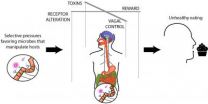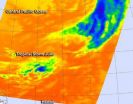(Press-News.org) Depression is known to be a common symptom of Parkinson's disease, but remains untreated for many patients, according to a new study by Northwestern Medicine investigators in collaboration with the National Parkinson's Foundation (NPF).
In fact, depression is the most prevalent non-motor symptom of Parkinson's, a chronic neurodegenerative disorder typically associated with movement dysfunction.
"We confirmed suspicion that depression is a very common symptom in Parkinson's disease. Nearly a quarter of the people in the study reported symptoms consistent with depression," said Danny Bega, MD, '14 GME, instructor in the Ken and Ruth Davee Department of Neurology and first author of the study. "This is important because previous research has determined that depression is a major determinant of overall quality of life."
Using the NPS's patient database, the investigators looked at records of more than 7,000 people with Parkinson's disease. Among those with high levels of depressive symptoms, only one-third had been prescribed antidepressants before the study began, and even fewer saw social workers or mental health professionals for counseling.
The investigators then focused their analysis on the remaining two-thirds of patients with depressive symptoms who were not receiving treatment at the start of the study. Throughout a year of observation, less than 10 percent of them received prescriptions for antidepressants or referrals to counseling. Physicians were most likely to identify depression and advocate treatment for patients with the severest depression scores.
The findings were published in the Journal of Parkinson's Disease.
"The majority of these patients remained untreated," said Dr. Bega. "Still, the physician recognition of depression in this population was actually better than previous reports had suggested."
However, recognition may be lower for the general population of patients with Parkinson's disease – the patients in this study visited medical centers deemed "Centers of Excellence" by the NPF.
"Physicians must be more vigilant about screening patients for depression as part of a routine assessment of Parkinson's disease, and the effectiveness of different treatments for depression in this population need to be assessed," said Dr. Bega.
INFORMATION:
Depression often untreated in Parkinson's disease
2014-08-15
ELSE PRESS RELEASES FROM THIS DATE:
Scientists discover interstellar stardust
2014-08-15
We may joke about looking for a needle in a haystack, but that's nothing compared to searching for stardust in a foil! A new paper published in Science reveals that such work has led to the discovery of seven dust particles that are not only out of this world, they're out of this solar system.
The Stardust Interstellar Dust Collector was launched in 1999 in an effort to collect contemporary interstellar dust—dust that has travelled to our solar system from another. The Collector returned in 2006; since then scientists have been combing through blue aerogel and aluminum ...
Credit allocation among researchers determined by new algorithm
2014-08-15
A new algorithm developed at Northeastern's Center for Complex Network Research helps sheds light on how to properly allocate credit.
The research was published this month in Proceedings of the National Academy of Sciences in a paper co-authored by Hua-Wei Shen, a visiting scholar at Northeastern and associate professor at the Institute of Computing Technology at the Chinese Academy of Sciences, and Albert-László Barabási, the Robert Gray Dodge Professor of Network Science and a Distinguished University Professor at Northeastern.
Using ...
New X-ray imaging developed by scientists
2014-08-15
Scientists have developed an x-ray imaging system that enables researchers to see 'live' how effective treatments are for cystic fibrosis.
Published in the American Journal of Respiratory and Critical Care Medicine, the imaging method allows researchers to monitor the effectiveness of a treatment for the life-threatening genetic disorder.
Cystic fibrosis affects many of the body's systems, but most severely the lungs, and currently it can take several months to measure how effective treatment is for the early-fatal lung disease.
Dr Kaye Morgan, lead researcher on ...
'Science' features PRB, WSU, DMC advances in preterm birth
2014-08-15
DETROIT – The Aug. 15 edition of the prestigious journal Science features a major article about the most important problem in obstetrics: preterm labor. The article, "Preterm labor: one syndrome, many causes," delivers a powerful message: preterm birth is not one condition, but many, and provides a framework for meeting this challenge.
"There are 15 million preterm babies born annually, and the condition affects 5 percent to 15 percent of all pregnancies, with the highest rates in North America and Africa. Prematurity is the leading cause of infant death up to age 1and ...
Charges for blood tests vary across California hospitals
2014-08-15
New UC San Francisco research shows significant price differences for ten common blood tests in California hospitals, with some patients charged as little as $10 for one test while others were charged $10,169 for the identical test.
The analysis of charges at more than 150 California hospitals looked at blood tests that are often required of patients, such as lipid panel, basic metabolic panel, and complete blood cell count with differential white cell count.
Hospital ownership and teaching status help explain a portion of the variation – prices generally were lower ...
Do gut bacteria rule our minds?
2014-08-15
It sounds like science fiction, but it seems that bacteria within us — which outnumber our own cells about 100-fold — may very well be affecting both our cravings and moods to get us to eat what they want, and often are driving us toward obesity.
In an article published this week in the journal BioEssays, researchers from UC San Francisco, Arizona State University and University of New Mexico concluded from a review of the recent scientific literature that microbes influence human eating behavior and dietary choices to favor consumption of the particular nutrients they ...
Stroke researchers link ability to self-administer medication with memory loss
2014-08-15
West Orange, NJ. August 15, 2014. Kessler stroke researchers and colleagues have identified an association between over-optimistic estimation of one's own ability to take medications accurately, and memory loss among stroke survivors. Results indicate that assessing patients for their ability to estimate medication skills accurately may predict memory disorder. The article, "Stroke survivors over-estimate their medication self-administration ability (MSA), predicting memory loss," was epublished ahead of print on May 28 by Brain Injury (doi:10.3109/02699052.2014.915984). ...
Visual exposure predicts infants' ability to follow another's gaze
2014-08-15
Following another person's gaze can reveal a wealth of information critical to social interactions and also to safety. Gaze following typically emerges in infancy, and new research looking at preterm infants suggests that it's visual experience, not maturational age, that underlies this critical ability.
The research is published in Psychological Science, a journal of the Association for Psychological Science.
"To the best of our knowledge, this is the first study showing that some aspects of the early development of social cognition is influenced by experience, even ...
NASA satellite spots a weakening Karina, now a tropical storm
2014-08-15
NASA's Terra satellite passed over Hurricane Karina before it weakened to a tropical storm early on August 15 and imagery showed the vertical wind shear was already taking its toll.
NASA's Terra satellite passed over Karina on August 14 at 2:40 p.m. EDT when it was still clinging to hurricane status and noticed that wind shear was already having an effect on the storm's structure. The Moderate Resolution Imaging Spectroradiometer or MODIS instrument captured an image that showed that the bulk of Karina's clouds were being pushed to the western side of the storm. That ...
NASA sees no punch left in Tropical Storm Julio
2014-08-15
Tropical Storm Julio doesn't have any strong thunderstorms or strong convection left in it according to infrared satellite imagery from NASA.
When NASA's Aqua satellite passed over Tropical Storm Julio on August 14 at 12:23 UTC (8:23 a.m. EDT), the Atmospheric Infrared Sounder known as AIRS analyzed the clouds and temperatures of the storm. The AIRS data showed that cloud tops had warmed and dropped lower in the atmosphere. That indicates that the strength behind rising air had weakened and was not forming strong, high thunderstorms with cold cloud tops.
There was a ...




